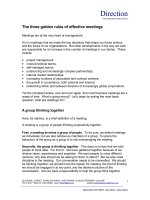IS_effective meetings
Bạn đang xem bản rút gọn của tài liệu. Xem và tải ngay bản đầy đủ của tài liệu tại đây (110.83 KB, 8 trang )
Direction
THE LEARNING CONSULTANCY
The three golden rules of effective meetings
Meetings are at the very heart of management.
It is in meetings that we make the key decisions that shape our future actions,
and the future of our organisations. But other developments in the way we work
are responsible for an increase in the number of meetings in our diaries. These
include:
• project management
• cross-functional teams;
• self-managed teams;
• outsourcing and increasingly complex partnerships;
• internal market relationships;
• increasing numbers of associates and contract workers;
• the growth in consultancy, both external and internal;
• networking within and between divisions of increasingly global corporations.
Yet the complaint arises, over and over again, that most business meetings are a
waste of time. What is going wrong? Let’s begin by asking the most basic
question: what are meetings for?
A group thinking together
Here, for starters, is a brief definition of a meeting.
A meeting is a group of people thinking purposefully together.
First, a meeting involves a group of people. To be sure, we attend meetings
as individuals; but we also behave as members of a group. To ignore the
behaviour of the group as a group is to risk mismanaging the meeting.
Secondly, the group is thinking together. This does not mean that we wish
people to think alike. Far from it. We have gathered together because of our
diverse views, experiences and expertise. We want people to voice different
opinions; why else should we be asking for them to attend? But we also need
discipline in the meeting. Our conversation needs to be channelled. We should
be thinking together: we should know the reason for meeting, the kind of thinking
we should be engaged in at any point, and the desired outcome of the
conversation. And we have a responsibility to help the group think together.
39 CUDNALL STREET CHARLTON KINGS CHELTENHAM GLOUCESTERSHIRE GL53 8HP
TEL & FAX +0044 (0) 1242 250884 email website www.direction-learning.co.uk
MANAGING PARTNERS Alan Barker Gillian Barker
1
Direction
THE LEARNING CONSULTANCY
39 CUDNALL STREET CHARLTON KINGS CHELTENHAM GLOUCESTERSHIRE GL53 8HP
TEL & FAX +0044 (0) 1242 250884 email website www.direction-learning.co.uk
MANAGING PARTNERS Alan Barker Gillian Barker
2
Direction
THE LEARNING CONSULTANCY
Why hold meetings?
The final part of our definition is that word ‘purposefully’. Meetings are
conversations with objectives. Yet too many meetings are held without a clear
objectives. In general, meetings are held with only four broad objectives:
• to discuss;
• to decide;
• to decree;
• to demolish.
Why do we hold meetings? The obvious answer is probably: “To discuss things.”
But why are we discussing them? “To make decisions,” we might reply. But it’s
not clear that a meeting is always the best way to decide things. Making any
decision is making a commitment to action, and gaining genuine commitment
from a group can be difficult. Consensus – the usual word for collective
decisions - is often code for ‘compromise’.
Collective decisions are vulnerable to:
• analysis paralysis: spending too much time pondering unnecessary detail;
• the dead hand of the past: ‘we’ve always done it this way’;
• groupthink: the urge to agree for the sake of group unity, at the cost of
considering alternatives.
Decisions are best made by individuals. Action responsibilities and
accountability are clearer when one person takes responsibility for a decision. Of
course, managers can call meetings to help them make better decisions: by
generating ideas, different points of view, and support or sponsorship for their
actions. However – at the risk of being controversial, for many management
meetings are called to decide things – we should challenge the principle of
collective decision making itself.
We should also challenge the idea that meetings are an appropriate way to
deliver information. Meetings are often called by senior management, who use a
‘briefing’ to announce their latest decrees, or by middle managers who are being
‘put through their paces’ in the familiar ritual of making a presentation to their
seniors. Yet information presented in the context of a meeting will be largely
forgotten unless it is supported in writing – particularly if the information is
complex. And, if it’s on paper, why hold the meeting?
What of ‘demolishing’? Meetings are often called to play politics. And ‘politics’
usually means destructive behaviour of some sort. Of course, we can distinguish
between influencing a meeting and wrecking it. The first is extremely common
39 CUDNALL STREET CHARLTON KINGS CHELTENHAM GLOUCESTERSHIRE GL53 8HP
TEL & FAX +0044 (0) 1242 250884 email website www.direction-learning.co.uk
MANAGING PARTNERS Alan Barker Gillian Barker
3
Direction
THE LEARNING CONSULTANCY
and may be acceptable. The second happens too often, though not always
deliberately. Ignorance, clumsiness or lack of insight than wrecks more meetings
by sabotage. Manipulating the meeting is another matter again. Manipulation is
essentially covert. Its secret weapon is the ‘hidden agenda’; its favoured strategy
is to exploit the dynamics of group behaviour. Manipulators create alliances and
sow the seeds of conflict; they confuse and divert and seek to outmanoeuvre the
opposition. Meetings infected with manipulation tend to repeat themselves. The
losers in one round will fight back in the next; reputations will be undermined and
plans scuppered; co-operation gives way to stonewalling. Such situations can
persist for years.
If we want to improve the quality of our meetings, we must start with a better
sense of why we want to hold meetings at all.
Here are some powerful reasons for holding meetings.
• To exchange and evaluate information. Meetings help us understand what
others in the team are doing, and how it fits with our own work. Meetings help
us to avoid duplicating tasks and locate our work in a larger context. In
meetings, we can see the bigger picture.
A group can evaluate information more effectively that a single person. In
groups, we can bring multiple perspectives to bear on information, resulting in
fewer gross errors of understanding. Gathering, exchanging and evaluating
information are important activities in any organisation.
Briefings exchange and evaluate information in a particular way. Staff survey
consultations, or meetings between consultants and clients, all have this aim.
Team leaders explain higher level decisions and changes so that the team
can see how they are affected. In exchange, the team can check their
understanding, evaluate how the changes will affect their work and build their
commitment to them. Critically, team briefings also allow the team to send
their responses to change – and their own ideas – back ‘up the line’.
• To solve problems. Virtually all meetings will involve problem-solving of
some kind. A group’s success in solving a problem depends on the quality of
its thinking: not how much thinking it does, but the kind of thinking it engages
in. Problems need to be defined and the appropriate thinking tools chosen to
tackle them. They tend to fit into two very broad categories: situations that
are unsatisfactory in some way, or challenges arising from a change in
circumstances.
Groups are not good at solving problems that need expert knowledge or
subtle reasoning. With such problems, the group will only think as well as its
most competent member.
39 CUDNALL STREET CHARLTON KINGS CHELTENHAM GLOUCESTERSHIRE GL53 8HP
TEL & FAX +0044 (0) 1242 250884 email website www.direction-learning.co.uk
MANAGING PARTNERS Alan Barker Gillian Barker
4
Direction
THE LEARNING CONSULTANCY
• To resolve conflict. Meetings can help to find the source of conflict and to
explore different ways of dealing with it. The most obvious example of such a
meeting would be a negotiation (though not all negotiations start from a
position of conflict, of course).
Conflict can easily arise within any kind of meeting. Solving problems and
evaluating information can cause arguments that must be resolved if the
group’s thinking is to progress. Building or repairing morale at times of
change and uncertainty can often mean resolving conflicts.
• To inspire. Humans are biologically gregarious. Very few of us can get
through a day comfortably without interacting with others. We like to meet:
especially in work situations that tend to isolate us from each other. Meetings
give meaning to our work by relating it to the work of others; they can help us
through difficulties by allowing us to share problems. The support of the
group energises and motivates individuals to perform better. Groups'
members who set their own goals often demand more of themselves than
their superiors do.
Why meetings fail
Meetings are natural events. They appeal to deep-seated needs for social
contact and a sense of belonging. For that reason alone, the damage done by
poor meetings is probably far greater than we realise. A poorly managed
meeting may cause more harm – in terms of frustration, confusion and poor
morale – than a meeting that is cancelled.
There is usually no mystery about why meetings fail. We can identify a small
number of factors that are at the heart of poor meetings management.
• The meeting is unnecessary. The job could be done in some simpler,
cheaper way: it is routine and does not need to be discussed; information can
be exchanged on paper or electronically. Perhaps only one or two people
need to be involved, or the problem needs the attention of a single expert.
Perhaps there is nothing to be done at all!
• The meeting is held for the wrong reason. To discuss, to decree or to
demolish: all common reasons for holding meetings, and all inadequate.
Managers often call meetings merely to wield power over others, or to pursue
some private agenda. They use the meeting to rubberstamp or steamroller
decisions.
39 CUDNALL STREET CHARLTON KINGS CHELTENHAM GLOUCESTERSHIRE GL53 8HP
TEL & FAX +0044 (0) 1242 250884 email website www.direction-learning.co.uk
MANAGING PARTNERS Alan Barker Gillian Barker
5









